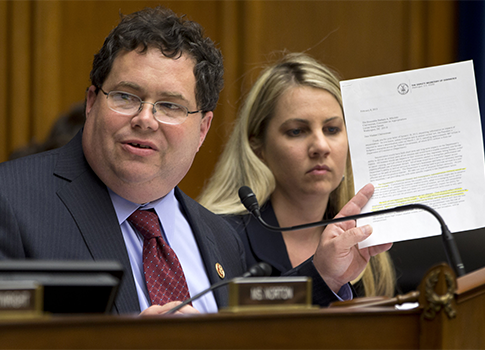Executive agencies did not prepare for the sequester despite knowing about impending cuts for over a year and a half, a congressional hearing on Tuesday afternoon revealed.
Republicans blamed the administration for failing to prepare for the cuts and for not seeking ways to mitigate their impact. Democrats called the cuts irresponsible.
Representatives from the U.S. Department of Agriculture (USDA), Federal Communications Commission (FCC), and U.S. Department of Commerce testified before a joint meeting of two subcommittees.
USDA and Commerce representatives both testified that they did not expect the sequester to take effect. USDA’s representative also noted that the nature of the cuts prevents money from being transferred among the agencies' various accounts.
"Why didn’t agencies at least have a contingency plan?" said Rep. Blake Farenthold (R., Texas), chairman of one of the subcommittees.
Rep. Matt Cartwright (D., Penn.) lamented the cuts to the agencies, especially to the USDA.
"This department will be cut by nearly $2 billion, which reduces or eliminates some of the nation’s most vital programs," he said in his opening statement.
A USDA representative said the agency would have to furlough meat safety inspectors due to the sequester.
Rep. Darrell Issa (R., Calif.) pointed out that he sent a letter to each agency asking for areas where Congress could help the agencies mitigate the cuts.
Only the Department of Defense has responded with specific points, he said.
"The question is, if you wanted to avoid cuts, if you wanted to avoid the scare tactics that we’ve been hearing about—you know, not being able to get fresh meat—wouldn’t you have responded at least with a couple that Congress could have acted on before the Easter recess?" Issa said.
Issa said he could file a new bill within an hour and insist that the House leadership take it up, if it were narrow enough. Each agency is required to provide a sequestration plan to Congress by April 1.
Rep. Eleanor Holmes Norton (D., D.C.) criticized Republicans for controlling the agencies’ finances.
"A Republican-controlled House has continued the longstanding practice of controlling the power of the purse, which by law denies federal agencies the freedom to spend money as they choose. Rather, they have to spend money as Congress chooses for them and are not free to undo sequestration on their own," she said.
The Constitution gives Congress the power of the purse. "No money shall be drawn from the Treasury, but in consequence of appropriations made by law," Article 1, Section 9, Clause 7 says.
Norton’s office did not immediately return a request for comment to clarify her statement.
Norton also argued that the lost federal spending would have benefitted the private sector; the cuts to USDA would hurt "farmers, agri-business and poor people."
She did not note that SNAP, the federal food supplement program, is exempt from the cuts.
Issa noted that agencies could offset the depth of the across-the-board cuts by cutting money strategically before the president issued a March 1 sequestration order. He cited the FCC as an example of an agency that cut costs before March 1, resulting in smaller cuts across the board within the agency.
"The FCC, by comparison, anticipated a law that has been on the books for 19 months, and began making sensible, if you will, austerity, while agency after agency acts surprised that a law signed by the president 19 months ago actually meant what it said," he said.
Multiple congressmen lamented the Office of Management and Budget’s (OMB) advice to the executive agencies to continue normal spending. When OMB issued that advice, it also offered to begin consulting on sequestration preparation.
"The bottom line is that agencies should have planned better for the sequester," Farenthold said.
